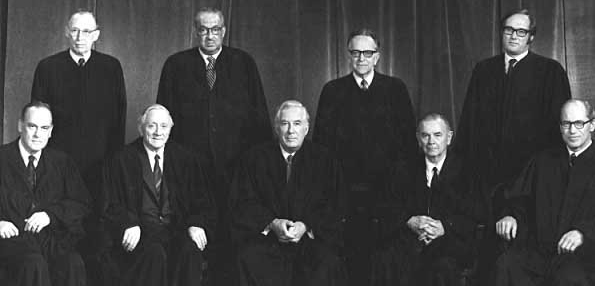It’s perversely fitting, I suppose, that Roe v. Wade, the most divisive Supreme Court ruling of the past 50 years, will likely be overturned at the most divisive national moment since it was issued, promising even deeper division.
Justice Samuel Alito’s leaked draft opinion reversing Roe, if it becomes the official ruling of the court, will open a broad new front in the uncivil war raging among Americans — as if we weren’t already dangerously polarized.

Three White House guards rollup the red carpet as President Nixon leaves in a helicopter after resigning. (Getty Images)
It reminds me of an earlier time. Return with me to those crazy days of the early 1970s, when anger over Vietnam, Watergate and other issues spilled into the streets, threatening to bring down the republic. The United States was staggering out of a decade of political assassinations, riots, bitter struggles over racism and civil rights, and increasing disillusionment with the tarnished ideals of America the beautiful.
The postwar glory days were over. Was America (or “Amerika,” as we spelled it during my brief stint as a teenage revolutionary) really the greatest nation on earth, the beacon of freedom and democracy — or just another crumbling empire built on political corruption, lies and oppression? The resignation in disgrace of President Richard Nixon in 1974 before his looming impeachment for the Watergate scandal marked the climax of that age of doubt and the beginning of a long road back to some measure of national stability and self-confidence.
New battles
But another social thunderbolt had struck more than a year before: The Supreme Court ruled in January 1973 that women have a constitutional right to abortion. The Roe v. Wade decision would unleash whole new ideological battles that eventually would overshadow the issue of abortion itself.
Pre-Roe, some states had been moving toward legalizing abortions to stop the tragedy of maternal deaths from dangerous illegal procedures. Abortions under special circumstances (rape, incest, fetal abnormality, threat to the mother’s life) already were legal in 16 states. The procedure was legally available without serious restriction to residents in three additional states and legal for anyone, resident or otherwise, in New York, which had become a magnet for women from elsewhere seeking abortions.
“It wasn’t easy for women to obtain safe and legal abortions in large areas of the country, to be sure.”
It wasn’t easy for women to obtain safe and legal abortions in large areas of the country, to be sure — especially poor women who were still dying from illegal procedures. But the trend appeared to be moving in the direction of eventual state-by-state legalization.
Organized opposition to legal abortion at the time existed largely in the medical community and the Roman Catholic Church. The growing feminist movement favored unfettered access to abortion, as did population-control advocates of various stripes. Still, a rough national consensus — or uneasy truce — over legal abortion with some restrictions might have been reached in time, despite deep religious and moral qualms among many Americans.
The court declares
Wishful thinking? It’s a moot point now, because into this delicate legal and political negotiation strode the Supreme Court, preemptively declaring a near-absolute right to abortion. Justice Harry Blackmun, a Republican and Nixon appointee, wrote the 7-2 majority opinion in Roe v. Wade. His meandering, tortured logic located this new right in an implied constitutional right to privacy found in an earlier case. The government, Blackmun said, had a justified interest in intervening in abortion only in the second or third trimester of pregnancy, as the fetus approaches viability.
Fatefully, the court took no position on whether, or when, an unborn child becomes a person deserving his or her own right to life under the Fourteenth Amendment. Such a judgment was beyond the scope of the court, Blackmun wrote: “We need not resolve the difficult question of when life begins. When those trained in the respective disciplines of medicine, philosophy and theology are unable to arrive at any consensus, the judiciary, at this point in the development of man’s knowledge, is not in a position to speculate as to the answer.”
“Fatefully, the court took no position on whether, or when, an unborn child becomes a person deserving his or her own right to life under the Fourteenth Amendment.”
One might say that ongoing doubt about such a weighty question argued in favor of the justices not ruling at all until consensus emerged. But rule they did.
It took a few years for the magnitude of the ruling to sink in, but eventually all hell broke loose. Ideological factions chose sides. Previously neutral religious groups leapt into the fray. Cynical politicians took advantage of the passions surrounding the issue to garner votes. Philosophical positions hardened into non-negotiable articles of faith. Nuanced dialogue ceased.

Associate Justice Harry Blackmun of the U.S. Supreme Court in 1974. (Getty Images)
For many pro-lifers, abortion was murder, period — or permissible only in the most extreme cases. For many pro-choicers, any restriction whatsoever on abortion was a tyrannical attempt by the church or the state to deny women control of their own bodies.
The conflict, to be sure, was stoked in part by absolutists in the religious sphere — Catholics and evangelicals (newly mobilized by the Religious Right) who found common cause in fighting abortion and other “culture war” issues. Their most bitter enemies were even more uncompromising: feminists and abortion-rights activists for whom the right to abortion without restriction became almost a holy sacrament.
Nationalized and polarized
But to indict the extremists alone for poisoning the abortion debate is simplistic and dishonest. The Supreme Court itself deserves blame for prematurely deciding — on dubious constitutional grounds — an agonizing moral issue that was still being confronted by the nation, its citizens and its legislatures.
“To indict the extremists alone for poisoning the abortion debate is simplistic and dishonest.”
“It’s likely that the debate would have been nationalized and polarized eventually no matter what,” wrote Ross Douthat May 7 in The New York Times. “But the Supreme Court decision nationalized abortion politics in a very specific way, removing most abortion regulation from the realm of legislative debate and linking it to the court itself and the office of the presidency. Thereafter, instead of being fought over in the institutions that are designed to channel mass opinion and activist mobilization into stable settlements — whether state legislatures or the Congress — abortion would be bound to the all-or-nothing outcomes of presidential elections and Supreme Court nomination fights.”
Douthat added (and I quote him at length because he brilliantly summarizes much of the past half-century of liberal-conservative debate):
The way Roe was decided made this polarization worse. From the perspective of geography and class, a group of robed lawyers in Washington, D.C., demanding that the country simply accept their settlement on one of the gravest moral questions imaginable is the perfect primer for a populist revolt. …
From the perspective of religion, meanwhile, by constitutionalizing the issue Roe didn’t just hand a normal political defeat to the pro-life side; it seemed to read their core convictions out of the American constitutional order entirely, seeding a religious alienation that continues to bear bitter fruit today. And the timing was particularly unfortunate: When Roe was handed down, both Catholicism and evangelicalism had just passed through periods of reform and modernization that promised a reconciliation between Christian faith and liberal modernity. Then immediately, liberal modernity changed its demands and made them all-or-nothing, making the moral price of admission more than many Christians could reasonably pay.
Finally, and crucially for the deformation of liberalism itself, the price demanded was not just moral but intellectual — because Roe was not a persuasive constitutional decision, but rather the clearest-possible case study in what it looks like when justices legislate from the bench.
“Many Americans, religious or otherwise, remain deeply troubled about the morality of abortion, even if they support its legality for women in crisis.”
Many Americans, religious or otherwise, remain deeply troubled about the morality of abortion, even if they support its legality for women in crisis. And while polls consistently show majority support for legal abortion in most cases, majorities also support restrictions on the procedure, especially later in pregnancies.
The ‘seamless garment’
On a personal note, I was heedlessly pro-abortion as a young Christian — until I was confronted with the tragic realities of the issue while attending college. Was it really necessary, I asked, to legalize the destruction of an entire category of human life to ensure reproductive freedom for women? It seemed to be part of a larger developing “culture of death” across the Western world — euthanasia for the disabled, assisted suicide for the terminally ill and the elderly and so on.
I also learned about the vile, racist history of eugenics, one of America’s darkest chapters, and how the widespread promotion of abortion and sterilization among Native Americans, ethnic minorities, immigrants and other “undesirables” played an undeniable role (although some continue to deny it) in the early days of Planned Parenthood and other population-control schemes in the 20th century. Eugenics inspired the Nazis and their murderous racial policies. Later, population control run amok in China and India helped eradicate whole generations of female children before they ever had a chance to be born.
“I became a passionate pro-life advocate and remain so.”
I became a passionate pro-life advocate and remain so. But as the years passed, I began to see how the issue was regularly coopted and manipulated by Republican politicians — not to foster a culture of reverence for life, but to win elections. It dawned on me that it would be pointless to overturn Roe unless enough hearts and minds could be changed to build a true culture of life — the kind of loving support exemplified by crisis pregnancy centers that help women at every stage of their struggle.
I believe in the Catholic social teaching known as the “seamless garment”: Every human life is sacred and created in the image of God. A “consistent ethic of life” reveres and protects life at every stage, especially the lives of those who can’t protect themselves — the unborn, the weak, the ill, the poor, the disabled, the elderly, the immigrant, the refugee.
Catholic writer Mark Shea observes that this consistent approach “prevents both 1) the tendency of Progressive dissenters to flatten all moral issues to the same levels of significance (with the resulting absurdity of treating the minimum wage as though it is as grave a matter as the deliberate taking of innocent human life), as well as 2) preventing the tendency of their opponents to isolate the gravest moral issues and use them as excuses for ignoring — sometimes with open contempt — nearly all the rest of the church’s social teaching (as though opposition to abortion takes away the sins of the world).”
“We will become two hostile nations: one where abortion is legal and one where it is criminal, with a vast underground network transporting women who want an abortion from one to the other.”
Seeds of its own demise
The authentic — as opposed to political — pro-life movement has made significant headway along these lines in recent years, particularly among young Americans who reject the abortion absolutism of their elders. But that progress is being set back by decades, perhaps generations, by the draconian laws pushed by Republican governors and legislators to close or criminalize every avenue to legal abortion in red states.
The fury and conflict unleashed by those cynical actions will be greatly multiplied if Roe is reversed, returning the issue to the states. We will become two hostile nations: one where abortion is legal and one where it is criminal, with a vast underground network transporting women who want an abortion from one to the other.
Such is the toxic nature of our times. But it’s hard not to conclude that Roe v. Wade — imperiously imposed upon Americans once in search of consensus on abortion, but now grievously divided — contained the seeds of its own demise.

Erich Bridges
Erich Bridges, a Baptist journalist for more than 40 years, retired in 2016 as global correspondent for the Southern Baptist Convention’s International Mission Board. He lives in Richmond, Va.
Related articles:
Why I’m a pro-choice Christian and believe you should be too | Opinion by Laura Ellis
Letter to the Editor: A response to Laura Ellis on abortion and Christian Realism
The Supreme Court’s politicized decision on abortion will do nothing to help churches thrive | Opinion by Mark Wingfield
Alito and public opinion reveal the link between Roe and a broader white Christian nationalist agenda | Opinion by Robert P. Jones

